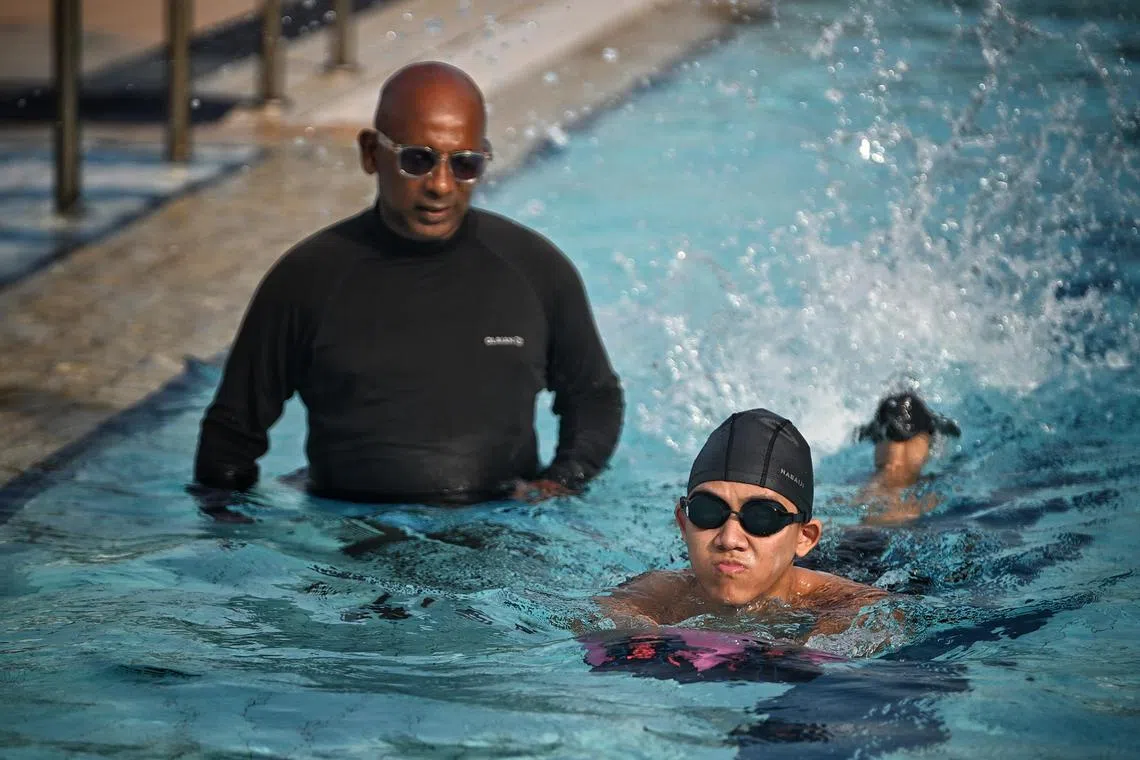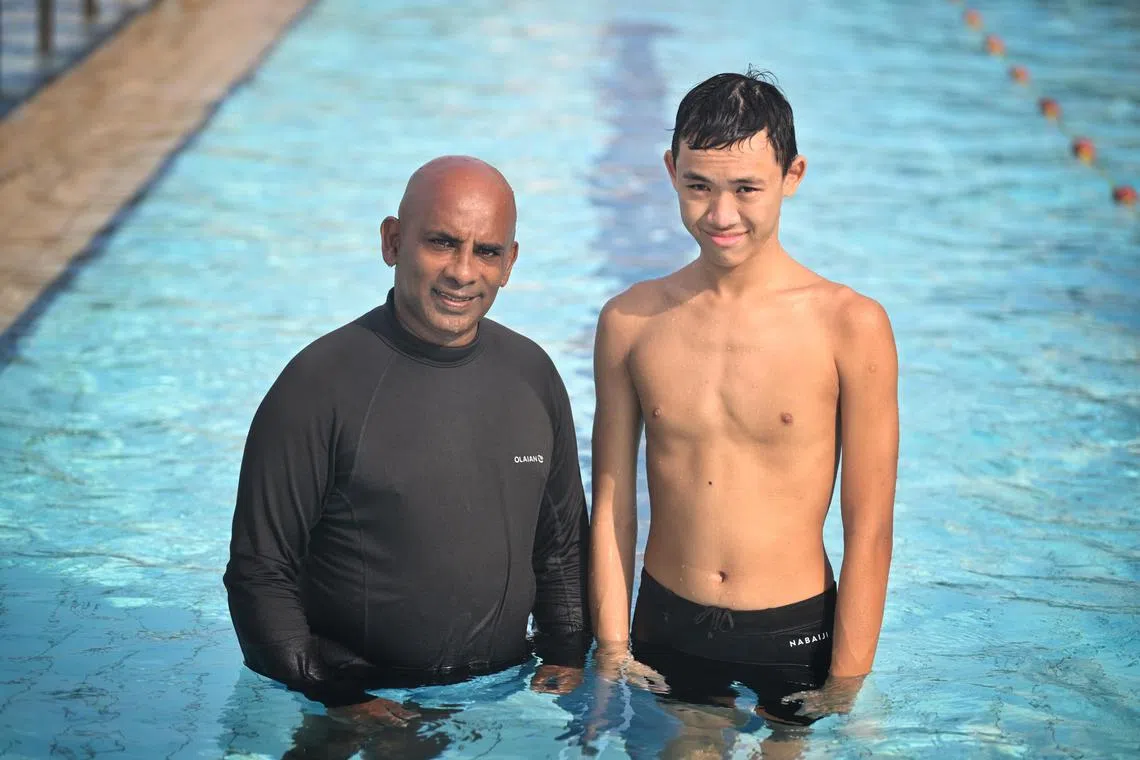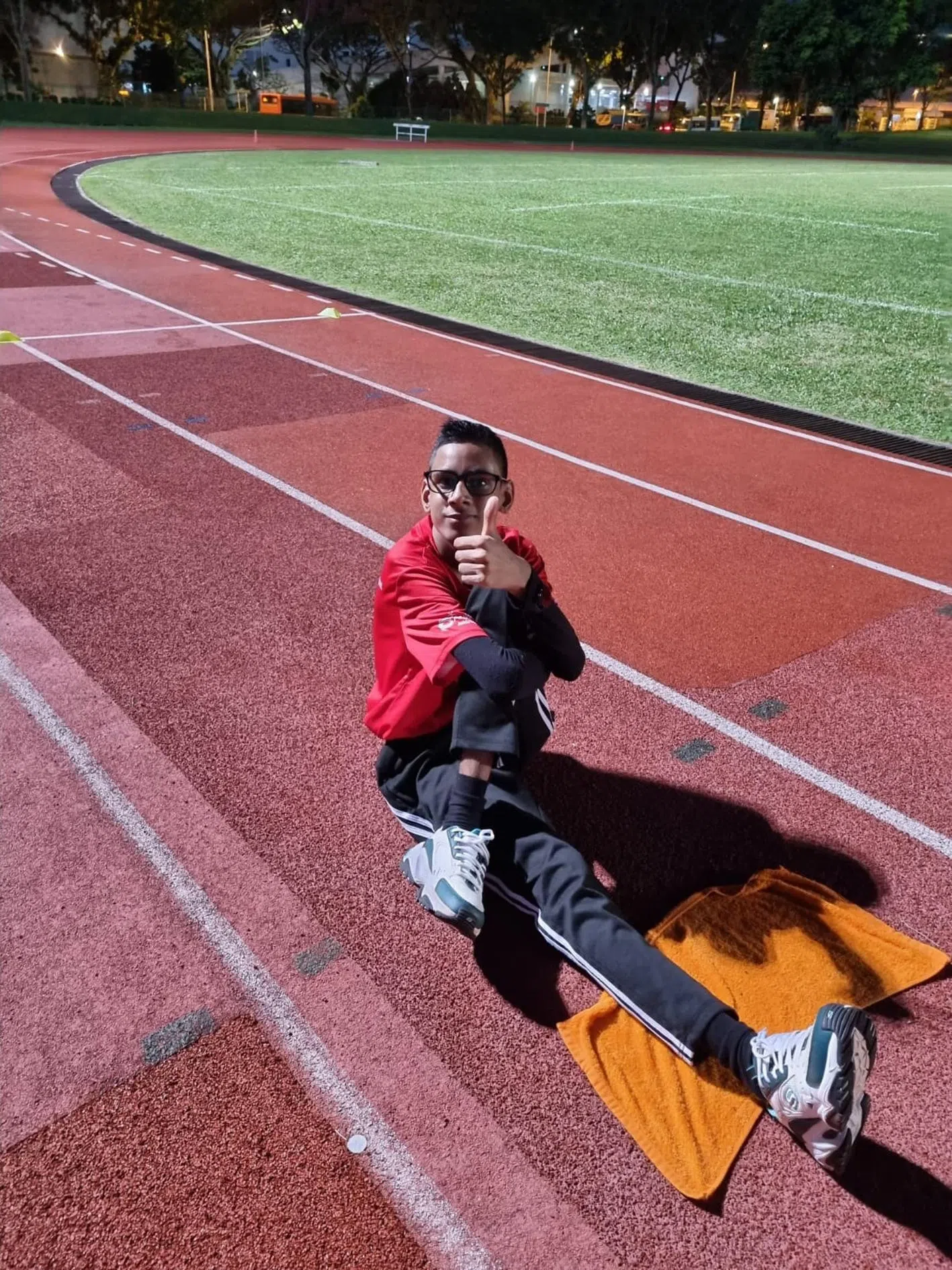From fear of water to aspiring swim champ: Para Sport Academy lowers barriers for participants
Sign up now: Get ST's newsletters delivered to your inbox

Mr Teo Yong Le and his coach Silas Parasurmam at Jurong West Swimming Complex on Jan 14, 2023.
ST PHOTO: CHONG JUN LIANG
Follow topic:
SINGAPORE – Diagnosed with moderate autism when he was two, Teo Yong Le went from being terrified of taking a shower as a child to winning backstroke and freestyle swimming competitions in school.
With the opening of a new sports academy in March 2022, he is training three times a week in the hope of taking part in the Paralympic Games some day.
The Para Sport Academy, launched by Sport Singapore as part of the 2016 Disability Sports Masterplan, has drawn more than 200 participants of all ages with physical or intellectual disabilities.
Participants, who do not need any sports experience, can choose from 10 sports taught by 30 coaches, with some students, such as Mr Teo, being selected for competitions.
Mr Teo, 20, is currently a trainee in Mountbatten Vocational School, after graduating from Eden School in 2021. There, he is trained in food preparation, food and beverage services and housekeeping.
His mother, Ms Pauline Lee, 62, said swimming has helped improve his focus and made him calmer. Mr Teo went from having meltdowns every two days in his teenage years to having virtually none in the past two years.
He is now able to take an MRT train to his school in Mountbatten from his Woodlands home by himself.
“During training, he used to (have the tendency to) look at others to see how far he was falling behind. But now, during competitions, he has stopped doing that,” said Ms Lee. “Actually I’m very, very amazed.”
She added: “Turn-taking and waiting is hard for people with special needs. He has become more patient. And swimming keeps him very calm, then he is able to control his emotions. So he is able to focus better.”
This is important as he goes from four-hour lessons in Eden School to eight-hour sessions in vocational school, she said.
“He keeps telling me ‘I want to win, I want to be the winner’, and he will always do his best,” she said. “Winning is not so important; at least he gets a chance to take part in national competitions, to swim with his peers and older national swimmers.
“I want him to be exposed to more competitions to gain confidence.”

Mr Teo Yong Le with coach Silas Parasurmam. The 20-year-old joined Para Sport Academy in 2022 and has trained with the school for swimming competitions since.
ST PHOTO: CHONG JUN LIANG
Mr Marcus Tan, chief of SportSG’s sport development group, said the academy was started to lower barriers of entry to sports for people with disabilities.
Those with potential may be scouted by the Singapore Disability Sports Council, the national sports body for the disabled.
Another enthusiastic participant is 17-year-old Shazuan Saleem, who was diagnosed with moderate autism at age three. Taking on the 100m and 400m sprints and long-jump training at the Para Sport Academy has improved his communication skills.
His mother, Ms Shakila Hanifa, 48, said he was a shy and quiet boy who did not communicate much with others. She recounted how he was bullied by other children at the playground when he was six as he was unable to speak.
But after joining the academy, he was better able to respond to others and also made friends with peers with special needs. He also commutes to school on his own, from Sengkang to Bukit Panjang.
Through weekly training sessions, Shazuan, who is studying horticulture at APSN Delta Senior School, learnt to better communicate with others. He even helps his teammates – by showing them how to do the long jump, for instance.
Ms Shakila, who works as a Singapore Post service ambassador, said: “He changed so much in the past year – I also thought it was unbelievable: ‘Wah, this is Shazuan?’.”
Mr Tan said SportSG is working with the healthcare clusters to design sports programmes for people with disabilities in rehabilitation, such as those with cerebral palsy who go for occupational therapy.
It hopes to increase the number of participants with sports tryouts, and bridging courses to train coaches to work with people with disabilities.

Shazuan Saleem, 17, who has autism, during track and field practice.
PHOTO: SHAKILA HANIFA
SportSG also launched a scheme in 2021 to provide agencies with $1,000 worth of ActiveSG credits that can be used to book its facilities and programmes.
Twenty-seven institutions – 11 special education schools and 16 adult centres – have come onboard the scheme, which is called Social Service Corporate Membership.
Ms Suzana Soo, principal of Minds Towner Gardens School, one of the participating schools, said: “Participating in sports builds up our students’ overall health, confidence and sense of achievement, especially with opportunities to compete nationally and represent Singapore.”
She added that creating more opportunities for people with intellectual disability to play sports also strengthens their inclusion in society.
“For example, students from special education and mainstream schools learn to empathise with their teammates’ needs and strive together as they compete at the annual Play Inclusive event. Our students enjoy these experiences very much,” she said.
Play Inclusive, organised since 2018 by Sport Singapore and Special Olympics Singapore and supported by the Ministry of Education, celebrates diversity through sport.
Ms Shakila, who has two other children with disabilities aged 20 and 23, said: “Other parents I know (with special needs children) are very mentally tired and upset sometimes, asking why their son is like that. I tell them we need to support them in whatever they can do, and not push them. What he wishes he can do, he can do.”
“I tell them: Don’t feel bad thinking about the future. Think about the current situation, motivate and support your children. They may have special needs, but treat them like normal.”
Ms Lee, who has two other sons aged 23 and 24, said: “For a non-swimmer to reach the level that (Yong Le did)... I can be very sure to say that for special needs children, as along as they are given a chance, they can be trained.
“I hope that we have a more inclusive society to give special needs children a greater chance to learn and to achieve what they can achieve.”

